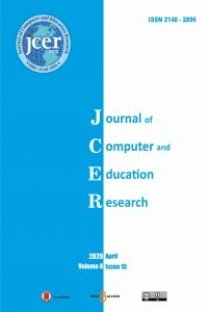Examining the Knowledge Levels of Classroom Teacher Candidates about Global Warming
The aim of this research is to examine the knowledge levels of classroom teacher candidates about global warming. The survey model was used in the study. The sample of the study consists of a total of 324 teacher candidates studying in the Kastamonu University Faculty of Education. The research was carried out in the fall semester of the 2019-2020 academic year. Global warming knowledge scale was used as a data gathering tool. In the analysis of the data, t-test for independent groups, one-way analysis of variance (ANOVA) and Bonferroni test were used. According to the findings, it has been determined that there was a significant difference in favor of female teacher candidates according to the gender variable who have been studying at the fourth grade level. However, when the knowledge levels of classroom teacher candidates studying at different grade levels on global warming were examined, it was determined that there was a significant difference between the scores of the first grade teacher candidates and the second, third and fourth grade teacher candidates in favor of the second, third and fourth grade teacher candidates
Anahtar Kelimeler:
Classroom teacher candidates, global warming, knowledge level
Examining the Knowledge Levels of Classroom Teacher Candidates about Global Warming
The aim of this research is to examine the knowledge levels of classroom teacher candidates about global warming. The survey model was used in the study. The sample of the study consists of a total of 324 teacher candidates studying in the Kastamonu University Faculty of Education. The research was carried out in the fall semester of the 2019-2020 academic year. Global warming knowledge scale was used as a data gathering tool. In the analysis of the data, t-test for independent groups, one-way analysis of variance (ANOVA) and Bonferroni test were used. According to the findings, it has been determined that there was a significant difference in favor of female teacher candidates according to the gender variable who have been studying at the fourth grade level. However, when the knowledge levels of classroom teacher candidates studying at different grade levels on global warming were examined, it was determined that there was a significant difference between the scores of the first grade teacher candidates and the second, third and fourth grade teacher candidates in favor of the second, third and fourth grade teacher candidates
Keywords:
Classroom teacher candidates, global warming, knowledge level,
___
- Aksan, Z. & Çelikler, D. (2015). Perceptions and opinions of primary school teacher candidates about combating global warming. Journal of Academic Perspective, 48, 207-222.
- Ay, F. & Yalçın-Erik, N. (2020). Knowledge and perception levels of university students about global warming and climate change. Sivas Cumhuriyet University, Faculty of Letters, Journal of Social Sciences, 2(2), 1-18.
- Bilgi, K. (2021). Examination of science teacher candidates' knowledge and attitude levels about global warming. (Unpublished Master's Thesis), Kırşehir Ahi Evran University, Kırşehir.
- Boyes, E. & Stanisstreet, M. (1992). Students' perceptions of global warming. International Journal of Environmental Studies, 42, 287-300.
- Büyüköztürk, Ş. (2007). Handbook of data analysis for social sciences. Ankara: Pegem Publishing
- Cunningham, W. P. & Cunningham, M. A. (2008). Principles of Environmental Science: Inquiry, Application. New York: McGraw-Hill Higher Education.
- Ergin, A., Akbay, B., Özdemir, C. & Uzun, S. U. (2017). Knowledge, attitudes and behaviors of medical school students about global warming and its effects on health. Pamukkale Medical Journal, 10(2), 172-180.
- Eroğlu, B. (2009). Determining the knowledge level of science teacher candidates about global warming. (Unpublished Master's Thesis), Gazi University, Ankara.
- Eroğlu, B. & Aydoğdu, M. (2016). Determining the knowledge level of science teacher candidates about global warming. Uludag University Journal of Education Faculty, 29(2), 345-374.
- Fraenkel, J. R. & Wallen, N. E. (2006). How to design and evaluate research in education. New York: McGraw-Hill International Edition.
- Görmez, K. (2007). Environmental problems. Ankara: Nobel Publications.
- Gülsoy, E. (2018). Knowledge and perceptions of university students on global warming and climate change. (Unpublished Master's Thesis), Süleyman Demirel University, Isparta.
- Gülsoy, E. & Korkmaz, M. (2020). The effects of university students' socio-economic characteristics on their perceptions of global warming and climate change. Turkish Journal of Forestry, 21(4), 428-437.
- Gürer, A. & Sakız, G. (2018). Adults' level of knowledge about global warming and recycling awareness. Journal of Human and Social Sciences Research. 7(2), 1364-1391.
- Küçük-Biçer, B. & Acar-Vaizoğlu, S. (2015). Determining the knowledge and awareness of nursing students about global warming/climate change. Hacettepe University Faculty of Nursing Journal, 2015, 30-43.
- McKinney, M. & Schoch, R. (2003). Environmental science system and solutions. Canada & London: Jones and Bartlett Publishers.
- Şenyurt, A., Temel, A.B. & Özkahraman, Ş. (2011). Examination of university students' sensitivity to environmental issues. Süleyman Demirel University Journal of Health Sciences, 2(1), 8-15.
- Tetik, N. & Acun, A. (2015). Perceptions and opinions of tourism students on global warming and climate change. Journal of International Social Research, 8(41), 1459-1476.
- Uyanık, G. (2016). Investigation of pre-service teachers' perceptions and sensitivity to air pollution in different undergraduate programs. Kastamonu Education Journal, 24(4), 1571-1588.
- Ürey, M., Çolak, K. & Okur, M. (2009). Regional differences in environment education of primary education in terms of teacher conceptions. Procedia Social and Behavioral Sciences, 1(1), 795-799.
- Yayın Aralığı: Yılda 2 Sayı
- Başlangıç: 2013
- Yayıncı: Tamer KUTLUCA
Sayıdaki Diğer Makaleler
Students' Experiences and Usability Evaluation in Interactive Digital Interface Development Process
İngilizce Öğretmen Adaylarının Öğretmenlik Uygulama Sürecine İlişkin Düşünceleri
Suleyman KASAP, Mehmet Şirin DEMİR, Fırat ÜNSAL
Research Trends on Digital Games and Gamification in Nursing Education
Mathematics Teachers’ Evaluation of Digital Stories and Views
Examining the Knowledge Levels of Classroom Teacher Candidates about Global Warming
